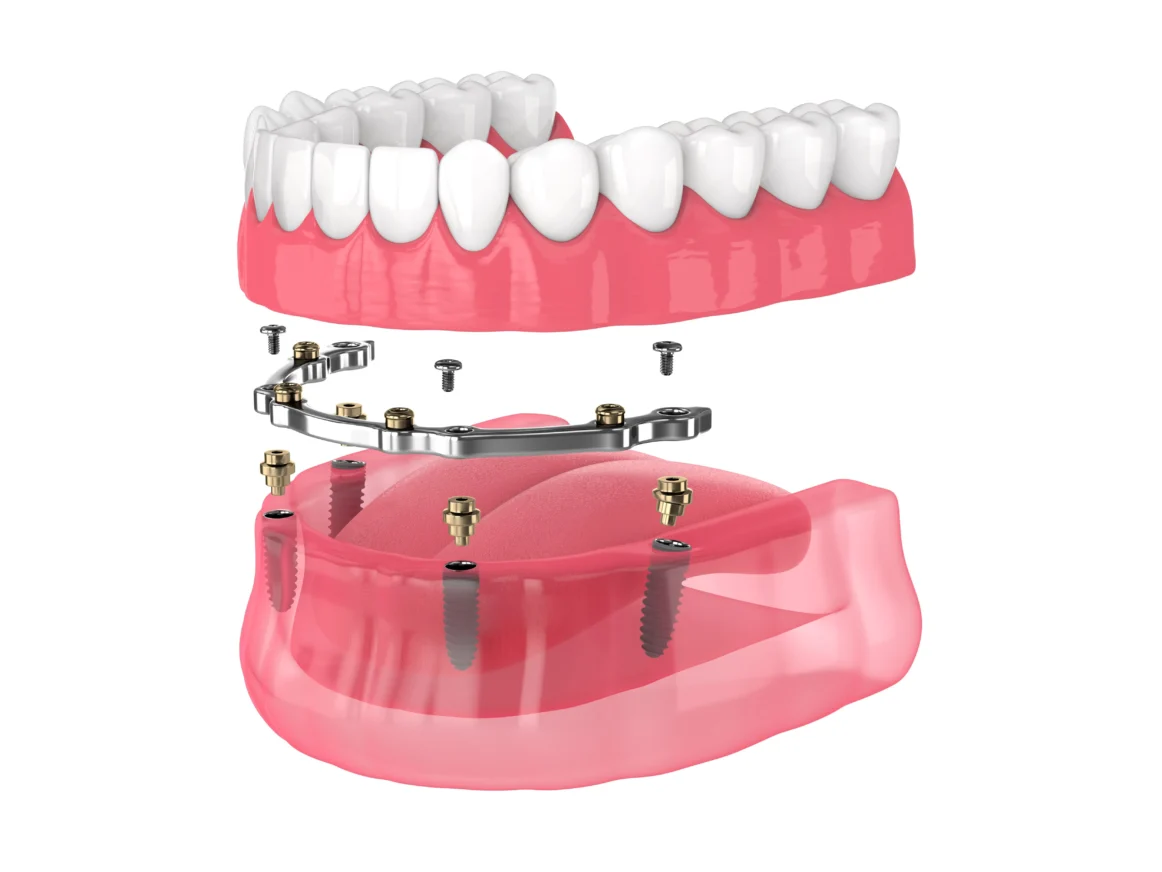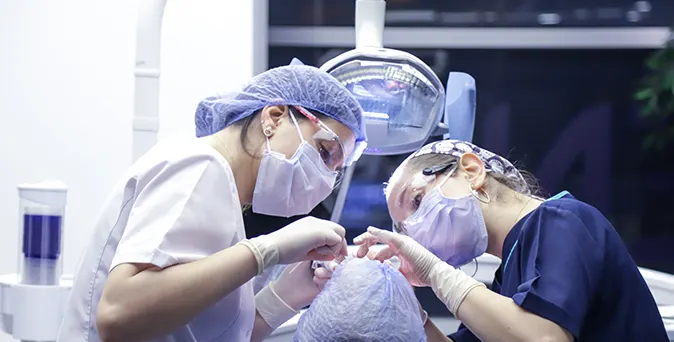Table of content
Table of content
Full Mouth Restoration Explained
Your smile is a vital part of your personality, yet dental issues like decayed, stained, or misaligned teeth can diminish confidence and make social interactions challenging. For individuals facing significant oral health concerns, a full mouth dental restoration offers a comprehensive solution.
By combining restorative and cosmetic techniques such as the All-On-4 procedure, veneers, and bridges, this treatment is tailored to restore both the function and beauty of your smile. It’s more than just a dental procedure—it’s a transformative approach to enhancing your oral health and self-confidence.
Let’s help you rediscover the joy of smiling with confidence!
Oral Health Issues That May Constitute a Full Mouth Restoration
There are several reasons why you might consider a full mouth restoration. Here are some common dental issues that may warrant a comprehensive treatment plan:
- Irreversible Tooth Decay: Severe tooth decay can destroy the underlying tooth structure due to excessive bacterial accumulation. This condition may lead to extreme pain, tooth loss, and weakened bone structure.
- Serious Mouth Injuries: Traumatic injuries resulting from accidents, falls, or sports can cause significant damage to the teeth and gums, such as fractures or tooth loss. These injuries often require comprehensive treatments like the All-On-4 technique to restore functionality and aesthetics.
- Loss of Tooth Enamel: The complete erosion of enamel and dentin, often caused by poor oral hygiene, dietary habits, or acid erosion, can lead to sensitivity and discomfort when consuming hot or cold foods and drinks.
- Gum Disease: Bacterial infections and gum inflammation can result in tissue damage, gum recession, tooth loss, and symptoms such as bleeding, halitosis, and swelling. Severe cases may necessitate a full mouth restoration to restore oral health.
These common oral issues highlight the importance of seeking professional help for a tailored treatment plan. To explore your options and start your journey to a healthier smile, consult our experts now! Simply reach out to us on WhatsApp and connect with one of our specialists today!
Types of Full Mouth Restoration Methodologies
Two of the most common and popular full mouth restoration techniques are the all-on-6 and all-on-4 implant restorations. The former focuses on making 6 implants, creating restorative support and is excellent for garnering a more stronger and more stable set of teeth.
- On the other hand, the all-on-4 treatment essentially comprises 4 implants but is less cost-intensive than the all-on-6 technique and is minimally invasive as well.
- However, choosing between the two is primarily based on the client’s preference and upon the consultative recommendation of the dentist.
- But both techniques come with high success rates, providing individuals with long-lasting results. Albeit, it is critical that you take your oral health and maintain the integrity of your implants.
- For affordable and high-quality cosmetic dentistry, contact Dentspa, a luxury dental clinic based in Turkey
A Glimpse Into What Peri-Implantitis Is and Its Causes
Peri-implantitis is the inflammation of the supportive tissue around the implants as a result of tooth extraction or missing teeth. This oral health complication happens when the delicate tissue encompassing an implant suffers a bacterial infection, causing the implant to break down.
The disease can lead to several symptoms, such as pain, inability to bite with force, trouble chewing food, and increased swelling. If the infection is not promptly treated, your dentist may have to remove the implant.
If you feel you have peri-implantitis, it is very important to schedule your visit with a qualified periodontist at Dentspa post-haste!
The Leading Causes of Peri-Implantitis
Typically, the major cause of peri-implantitis is not taking care of your oral hygiene. Not brushing and flossing after meals, over time, can result in bacterial accumulation in your gums, which may later transform into a serious infection and inflammation, particularly in the mucosa.
Some Common Factors That May Increase the Chances of Developing Peri-Implantitis
- Smoking: People who smoke stand a greater chance of developing symptoms associated with peri-implantitis. Smoking can minimize blood flow in the gumline and can also lead to developing plaque in the gum.
- Diabetic Individuals: People who have Type-2 diabetes (specifically those with an uncontrollable condition) can also develop peri-implantitis. Again, this can be caused due to poor blood circulation in the gums, which can make recovering from infections difficult.
- Inadequate Placement of a Dental Implant: Dental implants not carefully placed can also cause peri-implantitis. For instance, if the implant is placed in an area where there is inadequate bone support, it may lead to a bacterial infection, which in turn, may lead to the extraction of the implant.
The Role of 14 Implants in Lowering the Risk of Peri-Implantitis
The 14 implants approach, which is also typically referred to as all-on-14 implants, is another type of full mouth restoration where an experienced periodontist essentially implants artificial roots within the tooth implant.
The all-on-14 technique is an excellent treatment methodology for people suffering from peri-implantitis, as the procedure covers the teeth from both the upper and lower jaw. Book an appointment now with Dentspa
How Does the 14 Implant Approach Help Minimise the Risk of Peri-implantitis?
Provides Proper Occlusal Balance
One of the best things about the all-on-14 approach is that it provides the individual with a good balance between the upper and lower occlusal load, which is, simply put, the amount of force you generate while chewing or biting.
This, in turn, helps lower the risks of micromovement between different implants while reducing any stress, steering you clear of the chances of developing bone loss and inflammation.
Prevents The Risk of Bacterial Accumulation
Another key benefit of the all-on-14 technique is that because there are a lot of implants, the procedures help ensure that the individual has lasting prosthesis stability.
This can be effective for removing any gaps between the implants (where the bacteria may colonise and cause an infection).
In addition, it helps make maintaining your implants easier. As the implants are clustered together, you won’t have a hard time cleaning and flossing the hard-to-get regions of your mouth.
Why Dentspa?
Located in the heart of Istanbul, Dentspa redefines dental care by blending state-of-the-art treatments with a luxurious, spa-like experience. Our team of highly skilled dentists and periodontists use top-quality materials like titanium and zirconia, ensuring durable and long-lasting results.
With cutting-edge technology and personalised care, we prioritise your comfort and satisfaction. From advanced procedures to tailored dental packages, we cater to clients from all walks of life, making world-class dental care accessible and effective.
For a free consultation or to discuss your treatment options, connect with our specialists via WhatsApp today!
Bottom Line
So there you have it, an in-depth look into the benefits of a full mouth restoration treatment for missing teeth and other major oral complications and how it can help bring back that toothy smile and confidence.
For professional advice on full mouth restoration, book a free online consultation. Simply message us on WhatsApp for an immediate response.
Our specialists will answer all your questions about full mouth restoration and other dental treatments, and explain medical tourism in Turkey.
Frequently asked questions
Are full mouth dental implants a good idea?
Full mouth implants are the greatest option for patients who have several missing teeth. A long-lasting treatment that requires no maintenance, the patient has far less discomfort and fewer visits than replacing every single tooth.
How much are full-mouth dental implants in Turkey?
The cost of full-mouth dental implants in Turkey varies with each case, depending on the complexity and the materials used. At DentSpa, we ensure that every treatment utilizes only high-quality, reliable materials, providing an excellent balance of cost and quality to best meet your needs.
How many teeth can 1 implant hold?
Although implants are seldom used to replace multiple teeth on their own, they can be paired with others to replace up to six teeth. That implies an implant can only support up to three prosthetic teeth.
Can you eat with full dental implants?
Yes! Once you fully recover from the procedure. As they are more comfortable and sturdier they will help you bite and chew food that may have been difficult for you before.
How long do full mouth implants last?
Normal wear will last around 15 years. This is dependent on your nutrition, dental hygiene, and other habits. Regular checks will monitor the condition of the bridge’s crowns.
















 70%
70% 

